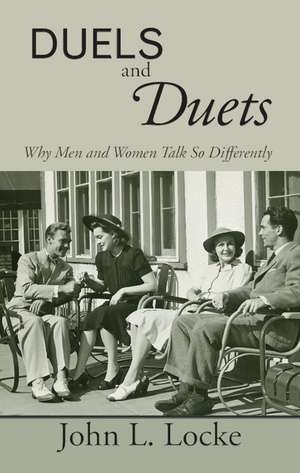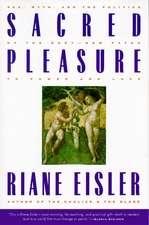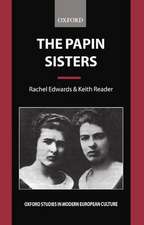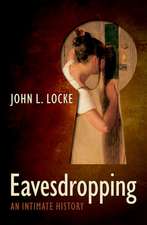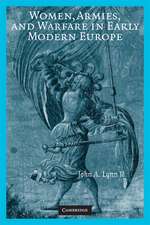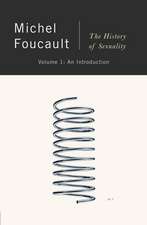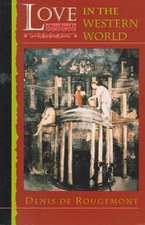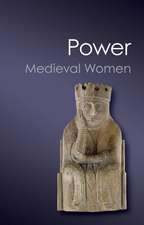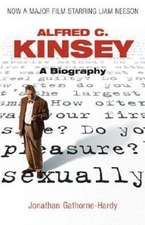Duels and Duets: Why Men and Women Talk So Differently
Autor John L. Lockeen Limba Engleză Hardback – 24 aug 2011
Preț: 264.56 lei
Nou
Puncte Express: 397
Preț estimativ în valută:
50.62€ • 52.96$ • 42.05£
50.62€ • 52.96$ • 42.05£
Carte disponibilă
Livrare economică 13-27 martie
Preluare comenzi: 021 569.72.76
Specificații
ISBN-13: 9780521887137
ISBN-10: 0521887135
Pagini: 252
Ilustrații: 6 b/w illus.
Dimensiuni: 146 x 224 x 19 mm
Greutate: 0.47 kg
Editura: Cambridge University Press
Colecția Cambridge University Press
Locul publicării:Cambridge, United Kingdom
ISBN-10: 0521887135
Pagini: 252
Ilustrații: 6 b/w illus.
Dimensiuni: 146 x 224 x 19 mm
Greutate: 0.47 kg
Editura: Cambridge University Press
Colecția Cambridge University Press
Locul publicării:Cambridge, United Kingdom
Cuprins
1. Speech, sex, and gender; 2. Duels; 3. Bards, heroes, Romeos, and clowns; 4. Why do men duel?; 5. Duets; 6. Complicity; 7. Why do women duet?; 8. Collaboration in language and in life.
Recenzii
'… an intriguing journey down the often uneven cobblestone road that is communication between the sexes … It certainly merits space on the bookshelf of anyone interested in how men and women contrast and compliment each other on the verbal landscape.' Richard G. Bribiescas, Yale University
'Accessible and entertaining, speech expert John Locke's book explores a provocative hypothesis: that well-known differences in men and women's speech patterns have a deep-rooted biological basis, related to sex differences in evolved mating strategies and preferences. Duels and Duets is sure to be controversial, but is so packed with intriguing facts and wry historical observations that it cannot be ignored.' W. Tecumseh Fitch, University of Vienna
'An exhilarating race through some of the issues closest to our hearts - why we speak and tell stories, and how there come to be sex differences in style.' Robin Dunbar, University of Oxford
'The physicist Ernest Rutherford supposedly commented that all science was 'either physics or stamp collecting'. If that is true, then John Locke's book represents a rejection of stamp collecting and an embrace of physics, as applied to questions about the history of human language. He uses data on sex and gender differences in language use to formulate a theory about the origins of language in the biological challenges faced by males and females during the period that language, and humanness itself, emerged. In the process, though, he also collects and conveys an engaging and wide-ranging array of facts and stories about language, from biologists, archeologists, anthropologists, historians, and linguists, ensuring his reader has the aesthetic experience of the stamp collector together with the intellectual experience of the physicist.' Catherine Snow, Patricia Albjerg Graham Professor of Education, Harvard Graduate School of Education
'With the lightest of touches underpinned by enormous scholarship this book will nudge those few remaining diehards into taking seriously biologically based sex-differences in language.' Tom Dickins, University of East London
'Locke is a true Renaissance man, weaving disparate sources of evidence into a brilliant, pithy, and thoroughly thought-provoking pageturner.' Anne van Kleeck, University of Texas, Dallas
'Showing his usual delinquency with respect to disciplinary boundaries, Locke provides an illuminating synthesis and extension of a fragmented literature.' David Good, University of Cambridge
'Locke is to be applauded for asking why so many men and women speak (and write and IM) differently from one another.' The New Scientist
'… a fascinating read. Chock-full of snippets of bizarre facts and, as one reviewer put it 'wry historical observation'. Not so much one for the self-help brigade as a must-have addition to the QI bookshelf!' The Bookbag
'You'll learn why men speak as they do when trying to pull a girl and how women adopt a different tone when talking to each other … An interesting viewpoint.' The Sun
'Accessible and entertaining, speech expert John Locke's book explores a provocative hypothesis: that well-known differences in men and women's speech patterns have a deep-rooted biological basis, related to sex differences in evolved mating strategies and preferences. Duels and Duets is sure to be controversial, but is so packed with intriguing facts and wry historical observations that it cannot be ignored.' W. Tecumseh Fitch, University of Vienna
'An exhilarating race through some of the issues closest to our hearts - why we speak and tell stories, and how there come to be sex differences in style.' Robin Dunbar, University of Oxford
'The physicist Ernest Rutherford supposedly commented that all science was 'either physics or stamp collecting'. If that is true, then John Locke's book represents a rejection of stamp collecting and an embrace of physics, as applied to questions about the history of human language. He uses data on sex and gender differences in language use to formulate a theory about the origins of language in the biological challenges faced by males and females during the period that language, and humanness itself, emerged. In the process, though, he also collects and conveys an engaging and wide-ranging array of facts and stories about language, from biologists, archeologists, anthropologists, historians, and linguists, ensuring his reader has the aesthetic experience of the stamp collector together with the intellectual experience of the physicist.' Catherine Snow, Patricia Albjerg Graham Professor of Education, Harvard Graduate School of Education
'With the lightest of touches underpinned by enormous scholarship this book will nudge those few remaining diehards into taking seriously biologically based sex-differences in language.' Tom Dickins, University of East London
'Locke is a true Renaissance man, weaving disparate sources of evidence into a brilliant, pithy, and thoroughly thought-provoking pageturner.' Anne van Kleeck, University of Texas, Dallas
'Showing his usual delinquency with respect to disciplinary boundaries, Locke provides an illuminating synthesis and extension of a fragmented literature.' David Good, University of Cambridge
'Locke is to be applauded for asking why so many men and women speak (and write and IM) differently from one another.' The New Scientist
'… a fascinating read. Chock-full of snippets of bizarre facts and, as one reviewer put it 'wry historical observation'. Not so much one for the self-help brigade as a must-have addition to the QI bookshelf!' The Bookbag
'You'll learn why men speak as they do when trying to pull a girl and how women adopt a different tone when talking to each other … An interesting viewpoint.' The Sun
Notă biografică
Descriere
Why do men and women talk so differently and how do these differences interfere with communication between the sexes?
